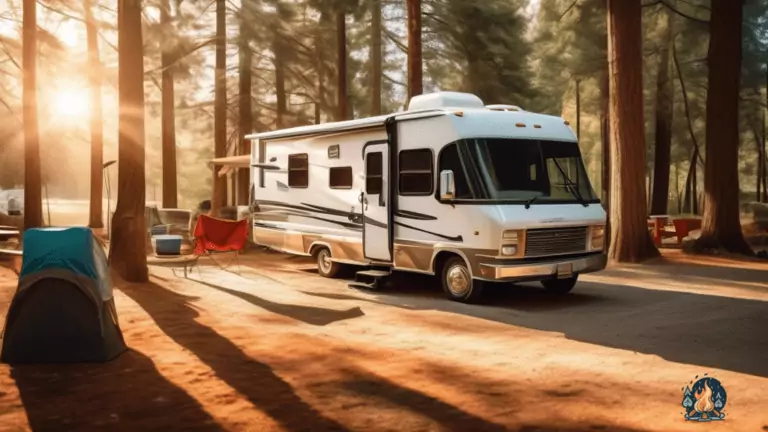Common Issues With RV Batteries And How To Troubleshoot
by Kevin Fairbanks • Updated: January 21, 2024
Having trouble with your RV battery? Learn how to troubleshoot common issues and hit the road worry-free! Click now for expert tips on RV battery troubleshooting.

Are you tired of your RV battery giving out on you during your trips? We understand the frustration of being stuck in the middle of nowhere with a dead battery. But fear not, because in this article, we will guide you through the common issues with RV batteries and how to troubleshoot them.
Now, you might be thinking, "Why do I need to troubleshoot? Can’t I just buy a new battery?" Well, while that may be an option, troubleshooting can save you time, money, and the headache of dealing with a faulty battery in the future.
So, let’s dive in and learn how to keep your RV battery running smoothly and avoid those unexpected breakdowns!
Maintaining your RV battery is essential for its longevity and performance. In this article, we will explore the signs of a failing RV battery, proper battery maintenance, troubleshooting battery drainage issues, testing and replacing RV batteries, and tips for extending the lifespan of your battery.
By understanding these common issues and knowing how to troubleshoot them, you will be well-equipped to handle any battery-related problems that may arise during your RV adventures.
So, let’s get started and make sure your battery keeps up with your wanderlust!
Key Takeaways
- Remove the battery from the RV when it is not being used to prevent draining and prolong its lifespan.
- Store the battery in a cool and dry place to avoid extreme temperatures and moisture, which can damage the battery.
- Give the battery a charge every few months to maintain its optimal performance and prevent it from becoming completely discharged.
- Regularly check the battery’s connections, terminals, and electrolyte levels to troubleshoot any potential issues and ensure its proper functioning.
Signs of a Failing RV Battery
If you’re experiencing dim lights, difficulty starting your RV, or a constant need to jumpstart your battery, it’s time to investigate the signs of a failing RV battery.
Now, I know what you’re thinking – "Great, just what I needed, another problem to deal with." But fear not, dear RVer, for I am here to guide you through this treacherous journey with a sprinkle of humor.
So, let’s dive in, shall we?
One of the most obvious signs of a failing RV battery is dim lights. If you find yourself squinting to see the road ahead, it’s time to pay attention. You might even start feeling like you’re in a horror movie, driving through the night with only a flickering candle for illumination. But hey, at least it adds some excitement to your journey, right? Wrong! Dim lights are not only annoying, but they can also be dangerous. So, don’t be a dimwit and get that battery checked out.
Another sign that your RV battery is on its last legs is difficulty starting your beloved home on wheels. Picture this: you’re all packed up and ready to hit the road, but when you turn the key, all you hear is a sad, feeble attempt at starting. It’s like your RV is saying, "Nah, I think I’ll just stay here and take a nap." Well, sorry to burst your bubble, but your RV doesn’t have the luxury of a naptime. It needs a healthy, functioning battery to get going. So, don’t let your RV become a permanent resident of your driveway and get that battery checked ASAP.
Proper Battery Maintenance
To ensure your battery remains in optimal condition, it’s essential that you regularly maintain it.
Think of it like taking care of a pet rock. You wouldn’t just leave your pet rock out in the rain and expect it to be happy, would you? No, you’d give it a nice cozy spot on your shelf and maybe even talk to it when you’re feeling lonely. Well, your RV battery needs the same kind of love and attention.
First things first, you’ll want to keep an eye on the water levels in your battery. Just like you need to stay hydrated, your battery needs water to function properly.
So every now and then, grab a glass of water and pour a little into each cell of the battery. Not too much though, you don’t want to drown it. Just enough to keep it quenched. And while you’re at it, give the battery terminals a nice little scrub. They can get pretty dirty and nobody likes a dirty battery. Plus, it gives you an excuse to wear those fancy rubber gloves you’ve been eyeing.
Next, you’ll want to make sure your battery is getting the exercise it needs. Just like you need to stretch your legs, your battery needs to be charged and discharged regularly.
So take your RV out for a little spin every now and then. Go on an adventure, explore the world, and give your battery the chance to flex its muscles. And when you’re not using your RV, make sure to disconnect the battery to prevent any unwanted drain.
You wouldn’t want your battery to feel like it’s being taken for granted, would you? So remember, a little love and attention goes a long way when it comes to proper battery maintenance. Keep your battery happy, and it’ll keep you happy on all your RV adventures.
Troubleshooting Battery Drainage Issues
When diagnosing battery drainage, it’s fascinating to note that a single LED light left on overnight can drain a fully charged RV battery.
Now, before you start blaming the poor little light bulb for all your battery woes, let’s dive into some troubleshooting tips to get to the bottom of this issue.
First things first, check if any other electrical devices or appliances are left on. It’s like a game of hide and seek, but instead of finding your little cousin in the closet, you’re on a mission to find that sneaky power drainer. You might be surprised to find that your TV, microwave, or even the fridge could be the culprits. So, go on a power hunt and turn off everything that doesn’t need to be on. Trust me, your battery will thank you.
Now, if you’ve played the power hunt game and still can’t find the source of the battery drain, it’s time to play detective with your RV’s wiring system. Check for any loose or damaged wires that could be causing a short circuit. It’s like finding a needle in a haystack, but hey, you’ve got this!
Don’t forget to check the battery terminals as well. Sometimes they can get dirty or corroded, leading to poor electrical connections. Give those terminals a good scrub and tighten them up if needed.
If all else fails, it might be time to call in the pros. An experienced RV technician can use their superpowers, I mean, their fancy tools, to diagnose and fix any wiring issues that are draining your battery.
So, don’t let that battery drain get you down. With a little humor and some troubleshooting, you’ll be back on the road with a fully charged battery in no time.
Testing and Replacing RV Batteries
When testing and replacing your RV batteries, you’ll want to make sure they are fully charged before beginning the process. This will help ensure accurate testing and prevent any unnecessary replacement.
Once your batteries are fully charged, you can follow these steps to test and replace them:
- Inspect the battery terminals: Start by inspecting the battery terminals for any signs of corrosion or damage. If you notice any corrosion, clean the terminals using a mixture of baking soda and water. This will help ensure a good connection and prevent any issues with the battery’s performance.
- Test the battery voltage: Use a multimeter to test the voltage of your RV batteries. This will give you an idea of their overall health and whether they need to be replaced. A fully charged battery should have a voltage reading of around 12.6 volts. If the reading is significantly lower, it may be time to replace the battery.
- Check the battery fluid levels: If you have a lead-acid battery, it’s important to check the fluid levels regularly. Use a hydrometer to measure the specific gravity of the battery’s electrolyte. If the readings are consistently low, it may indicate that the battery is no longer holding a charge and needs to be replaced.
- Replace the battery if necessary: If your RV battery is not holding a charge or showing signs of deterioration, it’s time to replace it. Make sure to choose a battery that is compatible with your RV’s electrical system and follow the manufacturer’s instructions for installation. Remember, a new battery can bring new life to your RV, so don’t be afraid to make the switch!
Remember, testing and replacing your RV batteries is an important part of maintaining your RV’s electrical system. By following these steps and keeping a close eye on your battery’s performance, you can ensure that your RV is always ready for your next adventure.
Happy camping!
Extending the Lifespan of Your RV Battery
You might think that neglecting your RV battery would be the best way to extend its lifespan, but that couldn’t be further from the truth. In fact, treating your battery with care and giving it the attention it deserves is the key to making it last as long as possible.
First and foremost, you’ll want to keep an eye on your battery’s water levels. Just like a parched traveler in the desert, your battery needs water to survive. So, make sure to check the water levels regularly and top it off when necessary.
And while you’re at it, give your battery a little TLC by cleaning its terminals. A clean battery is a happy battery, after all. So, grab a wire brush and gently scrub away any dirt or corrosion that may have built up. Your battery will thank you by staying healthy and strong.
Now, let’s talk about storage. When it comes to extending the lifespan of your RV battery, proper storage is crucial. You wouldn’t leave your pet goldfish in a hot car, would you? Well, your battery is no different. So, when you’re not using your RV, make sure to remove the battery and store it in a cool, dry place.
And don’t forget to give it some love every now and then. Just like a neglected houseplant, your battery needs some attention to thrive. So, give it a little charge every few months to keep it happy and healthy.
With these simple tips, you’ll be well on your way to extending the lifespan of your RV battery and enjoying many more adventures on the open road.
Frequently Asked Questions
Can I use a regular car battery in my RV?
Sure, you could use a regular car battery in your RV, but it’s like fitting a square peg in a round hole. RV batteries are specifically designed to handle the demands of your home on wheels.
How often should I check the water levels in my RV battery?
You should check the water levels in your RV battery every 2-4 weeks. Neglecting this task can lead to a 65% increase in battery failure rates. So, don’t be a water-level slacker! Keep those batteries hydrated!
What are the signs of overcharging in an RV battery?
If your RV battery is overcharging, you’ll notice signs like a funky smell, boiling liquid, and battery bulging like it just had a buffet. Time to put that battery on a diet and fix the charging system!
Is it normal for an RV battery to lose charge when not in use?
Yes, it’s totally normal for your RV battery to lose charge when not in use. It’s like your battery is on a vacation too, and who doesn’t love a little Ru0026amp;R? Just give it a good charge before hitting the road again!
Can I use solar panels to charge my RV battery?
Absolutely! Solar panels are a fantastic way to charge your RV battery. They harness the power of the sun to keep your battery juiced up and ready to go. Just remember to park in sunny spots, not the Batcave.

Hi, I’m Kevin, a lifelong camping enthusiast and the voice behind Campfire Discoveries. From tent to RV to cabin camping, I’ve explored it all. Join me as we share stories and tips around the campfire, deepening our connection with the great outdoors.
Keep Reading
-
Tent Materials Explained: Finding The Perfect Fabric For Your Tent
Uncover the secrets of tent materials explained for your next camping trip. From durable fabrics to weather-resistant options, find the perfect fabric for your tent and be ready for any adventure that comes your way. Upgrade your gear now!
-
Essential RV Maintenance Tips For Beginners
Learn the essential RV maintenance tips every beginner needs to know! From tire care to plumbing basics, this guide will keep your adventure wheels rolling smoothly. Don’t miss out on these must-know secrets – click now and start your RV journey with confidence!
-
Easy And Delicious RV Slow Cooker Recipes For Effortless Cooking
Looking for effortless cooking on the road? Check out these mouthwatering RV slow cooker recipes that are easy and delicious. Say goodbye to complicated meals and hello to stress-free cooking! Try them now.



